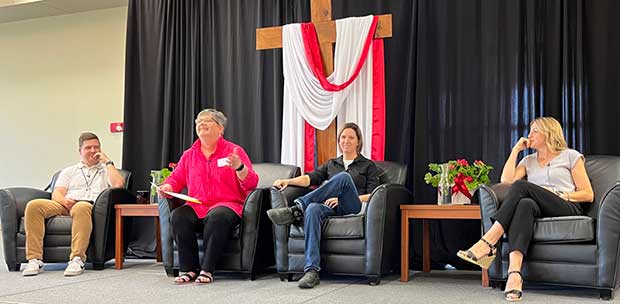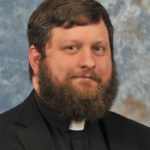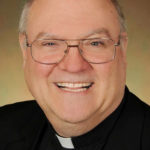
Panelists, from left, Trevor Pullinger, Sharon Roling, Julia Jones and Tasha Havercamp spoke about the theme of participation during the diocesan Synodal Summit last month in St. Ambrose University’s Rogalski Center in Davenport.
(Editor’s note: The following article is part of a series on the diocesan Synodal Summit, held June 17 at St. Ambrose University in Davenport.)
By Lindsay Steele
The Catholic Messenger
DAVENPORT — Encouraging people to participate in the life of the Church requires more than programming and bulletin announcements, panelists said during the diocesan Synodal Summit last month. “We have to find ways to explore and adapt,” said Trevor Pullinger, diocesan director of faith formation and catechesis coordinator.
Several-hundred people from parishes and schools throughout the diocese gathered in St. Ambrose University’s Rogalski Center June 17 for the event. The second of three panels focused on participation.
Tasha Havercamp, director of evangelization and mission for St. Paul the Apostle Parish in Davenport, talked about the importance of creating Christ-centric small groups where people feel comfortable and included. She encouraged the audience to consider Jesus’ example: “He took a small group and really lived life with them for three years.”
Catholics must personally reach out to people and consider their needs. “Think about that person you’re most saddened about not being engaged (in the faith community),” she said. “What do you think it would take to get that person into a small group?” It might mean meeting them for coffee, drinks or lunch and listening to their story. “What it will take is relationship,” she said.
Low-key fellowship opportunities are stepping stones to small groups and deeper parish engagement, she said. “We want to create safe spaces where people can belong and get to know each other in Christian fellowship.”
Youth minister Julia Jones of St. Ann Parish in Long Grove shared the story of her college-aged cousin, Jack and his “best church friend,” Bob. The older gentleman noticed Jack attending Mass alone and helped him feel connected to the parish by inviting him to get involved.
“Whether you have a youth minister or not, it is the responsibility of every adult in the parish” to empower youths in their faith journeys. “One person cannot do the job alone.” Everyone must work together to build stronger relationships with youths in the parish.
One way the Long Grove parish engages young people is by offering two spaces on the parish council. “Everyone at the table recognizes them as equals,” Jones explained. “Sometimes the conversation is over (the youths’) heads but they understand their roles and are held to a higher responsibility.”
She encouraged the summit participants to be more like her cousin’s friend, Bob. “Think about when you were growing up. Who was the Bob who made you feel connected? I invite you to become Bob and go be Bob for somebody else.”
School principal Sharon Roling spoke about St. Joseph Catholic School-DeWitt’s efforts to help students and parents feel welcome. Several years ago, she and the school secretary attended a workshop on student information systems and they were blown away by the “genuine, authentic, contagious” energy at the workshop. “We got out of the car and people were welcoming us. It was crazy fun!” On the way home, the women considered what it would be like to bring that energy back to the school.
Creating a culture of welcoming comes from a mixture of fun, engaging activities and intentional, everyday gestures, Roling said. Eighth-graders cheer on students on the first day of school by forming a tunnel and shaking pompons and that can be as welcoming as the lunch ladies learning students’ names and engaging them in conversation. When parents are on campus, it’s important to offer hospitality and help them connect with each other.
 Pullinger, a husband and father of six, discussed the importance of the domestic church. Parents play a huge role in passing on the faith and there are “a lot of ways to think about” family faith formation. But, parents need support. Recent diocesan polls show that many parents today struggle to share the faith with each other, much less their own children, he said. “They feel unqualified or not sure what to share or they’re afraid they’ll mess up.”
Pullinger, a husband and father of six, discussed the importance of the domestic church. Parents play a huge role in passing on the faith and there are “a lot of ways to think about” family faith formation. But, parents need support. Recent diocesan polls show that many parents today struggle to share the faith with each other, much less their own children, he said. “They feel unqualified or not sure what to share or they’re afraid they’ll mess up.”
It’s important to think about diocesan families and the challenges they face, including overscheduling, over-commitment, loneliness and exhaustion. “Finding a way to be an oasis for them” is crucial. “We want to be that place where the family can find rest,” as well as a sense of warmth and belonging. “To think creatively is to meet families where they hurt most and provide spaces where they can thrive.” Offering a free meal is one way to do this because it means the parents don’t have to cook and they can focus on being together.
After the panelists spoke, summit participant Jim Tiedje of Sacred Heart Cathedral in Davenport said he believes there is a “tremendous opportunity to bring people back” to the faith and help the next generation of Catholics. “I think we, as ‘Old Bobs,’ can start thinking differently about who these kids are and what they can accomplish.”











